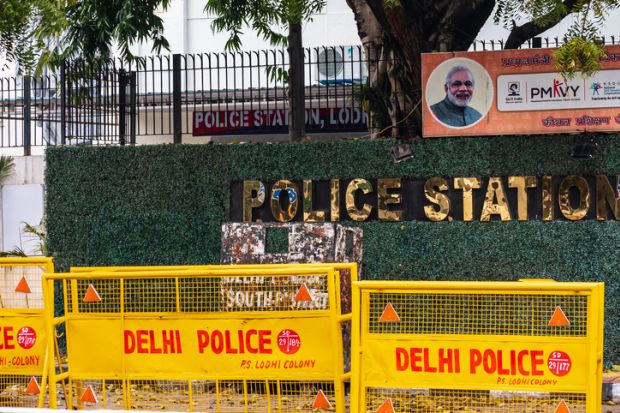Jawaharlal Nehru University (JNU) is a small world unto itself. Its sandstone campus in a leafy part of New Delhi remains a vibrant left-wing bastion in a country largely in thrall to Prime Minister Narendra Modi’s Hindu nationalist Bharatiya Janata Party.
But even this small island of opposition, it seems, cannot be tolerated. As dusk fell on 5 January, a large mob, faces covered with bandanas, entered the campus to break up a protest against recent college fee hikes. Wielding iron rods, they ran rampant for three hours, brutalising students while chanting Hindu slogans. A picture of the badly beaten student-union president, Aishe Ghosh, was distributed widely across the country. It was a graphic representation of a pattern of violence against students that has increased dramatically since the beginning of 2020.
Reams of evidence linked the JNU attack with a far-right student group affiliated with the BJP. The Delhi police, which is controlled by the central government, instead chose to file charges against Ghosh and her fellow left-wing students.
The BJP has two approaches to education. The first is sneering contempt. After Nobel laureate Amartya Sen criticised the government’s decision in 2016 to demonetise 86 per cent of banknotes in circulation in a calamitous attempt to fight tax evasion, Modi reminded him that “hard work is more important than Harvard”. This attitude is nothing more than a smokescreen for the BJP’s second, far more insidious, clear-eyed view of education: a powerful weapon to spread and entrench its Hindutva ideology, which glorifies an imaginary age of uncorrupted Hindu wisdom.
Immediately after the BJP’s romping election victory in 2014, its parent organisation, the Rashtriya Swayamsevak Sangh, formed a committee to “Indianise” education. At its head was Dinanath Batra, a self-appointed morality guardian who has made a career out of launching diatribes against an educational system he accuses of lacking sufficient commitment to the Hindu-nationalist cause. The government also installed a Hindutva ideologue with no research record to lead the Indian Council of Historical Research. Despite his apparent populist-playbook disdain for fancy degrees, Modi clearly recognises the potent significance of controlling academia.
It is widely believed that JNU was targeted for its students’ vocal stance against such ideas. Crucially, it had been a hotbed of protest against the Citizenship Amendment Act, which, in contravention of India’s constitutionally mandated secularism, imposes different citizenship rules on the basis of religion. The law provoked a stunning, often student-led backlash that roiled the country for months. JNU was not the only university targeted during this period: after protests at Jamia Millia Islamia, a prestigious Delhi college, police entered the campus and assaulted students with batons, pursuing them into dorms and libraries.
The government has also kept up a relentless pursuit of individual students. Kanhaiya Kumar, a JNU student who led a 2016 protest against the execution of a convicted terrorist, was arrested and charged under a 150-year-old sedition law designed to criminalise rebellion against the British Raj.
Some cases have verged on the surreal. Another former prominent JNU student activist, Umar Khalid, was arrested in September and charged with instigating deadly communal riots in Delhi earlier this year. The evidence was a speech he gave, full of such provocations as “We will not respond to violence with violence. We will not respond to hate with hate.”
Western universities are fiercely protective of their students, but Indian universities have no such pretensions. JNU backed the government’s intervention in the sedition row, expelling student protestors. During the brutal violence in January, the administration apparently let the chaos run its course for hours before calling the police. Another university vice-chancellor was filmed suggesting that leftist students should be taught “a lesson”. No level of dissent is left unpursued: a 20-strong anti-BJP student group at Chennai’s Indian Institute of Technology was de-recognised by the university after the government complained.
The immense divide between pro-government university administrations and dissenting student bodies is no accident. Modi’s first education minister, Smriti Irani, ran a far-reaching effort to install Hindutva sympathisers as university chancellors and proposed that the army teach university courses to “instil nationalism” among students. There is also a financial angle: central universities are funded by the government, and JNU, which is running a huge deficit, is among them.
To a degree, government views on education appear to have evolved over time. The National Education Policy, released earlier this year to general acclaim, aims to widen curricula to ensure that science-focused students are able to study the humanities, and vice versa. It also promotes a commendable shift towards critical thinking, away from the rote learning that has long defined Indian education. But will it stop jailing and beating students for demonstrating critical thinking with too much vigour?
The BJP should ask itself what it hopes to achieve by permeating every aspect of higher education. Does it wish to make India a world leader in academic research and innovation? Or does it want to force Indian universities into a mould that is exclusionary, inward-looking and obsolete to the point of farce?
Jawaharlal Nehru, decades ago, warned that Indians had “become prisoners of the past, and some parts of its immobility sticks to us”. The university that bears his name, and the government that makes a mockery of his legacy, should heed his wisdom and let the pursuit of knowledge flourish.
Aditya Sharma is a freelance writer and final-year student at Columbia University, studying political science and English.
Register to continue
Why register?
- Registration is free and only takes a moment
- Once registered, you can read 3 articles a month
- Sign up for our newsletter
Subscribe
Or subscribe for unlimited access to:
- Unlimited access to news, views, insights & reviews
- Digital editions
- Digital access to THE’s university and college rankings analysis
Already registered or a current subscriber? Login








